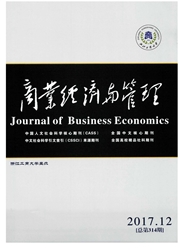

 中文摘要:
中文摘要:
文章结合供应链管理理论及营运资金管理理论,从供应链管理运作管理的视角出发,深入分析影响企业采纳预付款融资的因素。基于来自全国717个企业的供应链金融调查数据,文章利用对二分类因变量进行回归建模的Logistic回归模型,对企业采纳预付款融资的发生概率进行拟合。研究结果表明,从融资企业资金需求的角度,供应商提供原材料的平均交付周期越长、企业所采购物料的价格波动越大,企业越倾向于采纳预付款融资来解决资金问题,维持其正常运营。结合金融机构信用风险控制的考虑,相对于原材料价格波动小的企业,所在供应链信息化程度高对帮助原材料价格波动大的企业获得金融机构授信的作用更显著。同时,文章认为出于确保还款资金来源的考虑,金融机构更倾向于向原材料库存平均周转天数短的企业授信;融资企业引入外部金融机构资金所带来的额外融资成本,激励着企业更努力做好其原材料库存管理,缩短原材料库存平均周转天数,减少流动资金的无效占用,减少预付款融资的融资金额,降低融资成本。
 英文摘要:
英文摘要:
Based on supply chain management theory and working capital management theory, this paper analyzes the factors that influence the firms' adoption of prepayment financing from the supply chain management & operational management perspective. This paper fits the probability of firms' adoption of prepayment financing by using Binary Logistic Regression based on the survey da- ta of supply chain financing collected from 717 firms in China. The results show that, from the firms' financing need perspective, firms are more likely to adopt prepayment financing when the average raw material delivery cycles are longer and price volatility of the raw materials is higher. Taking financial institutions' credit risk control into consideration, compared with the firms with low price volatility of the raw materials, high informationization level helps the firms with high price volatility of raw materials to get the financing from the financial institutions greater. This paper also argues that financial institutions are more likely to finance the firms whose raw material inventory average turnover days are fewer, because financial institutions can insure the source of repayment. Andthe firms that adopt prepayment financing have motivation to manage raw material inventory better. Because it would add extra financing cost for the firms that adopt prepayment financing, the firms have to manage raw material inventory better to reduce raw materials inventory average turnover days, close the financing round earlier, and then reduce the financing cost.
 同期刊论文项目
同期刊论文项目
 同项目期刊论文
同项目期刊论文
 Firm orientation, community of practice, and Internet-enabled interfirm communication: Evidence from
Firm orientation, community of practice, and Internet-enabled interfirm communication: Evidence from Partner selection in a virtual enterprise: a group multi -attribute decision model with weighted pos
Partner selection in a virtual enterprise: a group multi -attribute decision model with weighted pos Transaction-Specific Investments, Relational Norms and ERP Customer Satisfaction: A Mediation Analys
Transaction-Specific Investments, Relational Norms and ERP Customer Satisfaction: A Mediation Analys The Research on Consumer Information Retrieval Behavior in Catering Location-based Information Servi
The Research on Consumer Information Retrieval Behavior in Catering Location-based Information Servi An Investigation of Interpersonal Ties in Inter-organizational Exchanges in Emerging Markets: A Boun
An Investigation of Interpersonal Ties in Inter-organizational Exchanges in Emerging Markets: A Boun Effects of information technology alignment and information sharing on supply chain operational perf
Effects of information technology alignment and information sharing on supply chain operational perf The Effects of Competitive Environment on Supply Chain Information Sharing and Performance: An Empir
The Effects of Competitive Environment on Supply Chain Information Sharing and Performance: An Empir Research on the Impact of the Telecom Terminal Customization Service Strategy on Customer Conversion
Research on the Impact of the Telecom Terminal Customization Service Strategy on Customer Conversion The impact of supply chain risk on supply chain integration and company performance: a global invest
The impact of supply chain risk on supply chain integration and company performance: a global invest Transaction-Specific Investments, Relational Norms, and ERP Customer Satisfaction: A Mediation Analy
Transaction-Specific Investments, Relational Norms, and ERP Customer Satisfaction: A Mediation Analy Modularity in building mass customization capability: The mediating effects of customization knowled
Modularity in building mass customization capability: The mediating effects of customization knowled 期刊信息
期刊信息
